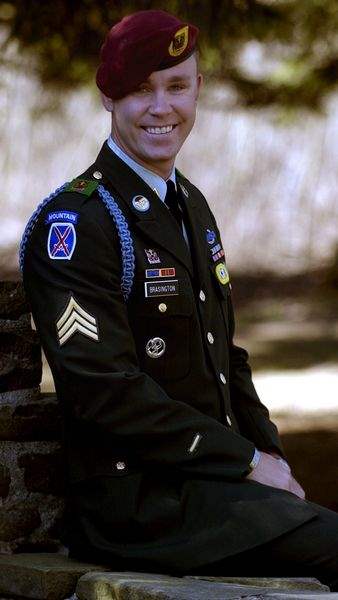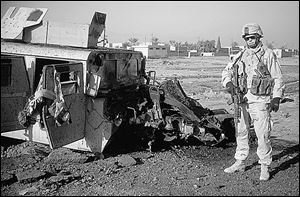
Soldier finds protection in prayer
4/16/2005
Sgt. Tommy Brasington, Jr., at home in Toledo on leave, will soon be training soldiers at Fort Polk., La., who are headed for Iraq and Afghanistan. Tommy Brasington, Jr. Sgt. Chris Adams stands beside the Humvee Sgt. Tommy Brasington, Jr., was riding in when it was hit by a roadside bomb.
Hires / Blade

Sgt. Tommy Brasington, Jr., at home in Toledo on leave, will soon be training soldiers at Fort Polk., La., who are headed for Iraq and Afghanistan. Tommy Brasington, Jr. Sgt. Chris Adams stands beside the Humvee Sgt. Tommy Brasington, Jr., was riding in when it was hit by a roadside bomb.
Thou shalt not be afraid for the terror by night; nor for the arrow that flieth by day ... A thousand shall fall at thy side, and ten thousand at thy right hand; but it shall not come nigh thee.
- Psalm 91, Verses 5 and 7
Riding along Iraqi highways in a desert-camouflaged Humvee, Sgt. Tommy Brasington, Jr., heard the chilling Army radio announcement many times: Enemy insurgents ahead.
The 27-year-old Toledoan, whose nine-month tour of duty in Iraq ended one month ago today, said facing the enemy in combat situations always struck two responses: fear, then prayer.
"At first, you're almost petrified with fear," he said. "You think, 'Is this going to be it?' Then you instinctively start praying. And God reverses that fear and gives you a ridiculous amount of strength."

Sgt. Chris Adams stands beside the Humvee Sgt. Tommy Brasington, Jr., was riding in when it was hit by a roadside bomb.
He said he and other Christians in his platoon wrote "Psalm 91" on bandanas that are worn under their Army helmets as a reminder of God's protection.
The strapping 6-foot-3, 200-pound soldier and Bible college graduate said that when bullets and rocket-propelled grenades started coming at him, when red-hot shrapnel was pelting his armor-plated Humvee and roadside bombs were exploding nearby, he didn't say formal prayers but carried on a "continuous conversation with God."
"It gives new meaning to the term, 'Pray without ceasing,'●" Sergeant Brasington said, referring to Apostle Paul's advice in his first epistle to the church of Thessalonica.
He served in three areas of Iraq and fighting was heavy in all three - the rural region southwest of Baghdad, the Green Zone in the middle of the city, and Abu Ghraib, the city where the infamous namesake prison is located.
Some of his escapes from harm were nearly miraculous, he said in an interview this week at his parents' Toledo home, and he is convinced that it was God's hand, not coincidence, that kept him safe.
In December, for example, an Iraqi insurgent detonated a "roadside bomb" - the Army calls them IEDs for Improvised Explosive Device - under his 10,000-pound Humvee, sending the vehicle and its five occupants airborne. The Humvee crashed down yards from the blast crater and a "run flat" - a tire component that allows the vehicle to continue moving even with a flat - flew 300 yards, clearing a three-story building.
Only one soldier was hurt, and that was a minor injury - a torn miniscus in his knee after the dashboard fell when the Humvee hit the ground.
"God only knows why we weren't all killed," Sergeant Brasington said, adding that the perpetrator was quickly captured by other soldiers.
His best friend, 21-year-old Sgt. Brett Swank of North Umberland, Pa., was not so fortunate. He was killed in January when an IED exploded next to his Humvee, the concussion from the blast crushing the side of the vehicle.
Sergeant Brasington had another brush with death when his squad was patrolling a residential area of Baghdad.
A 6-year-old Iraqi boy approached the soldiers and, using hand motions and saying "boom," warned them that a bomb was buried nearby.
"A lot of times, it's a scam so they know how you'll react," Sergeant Brasington said. "They'll laugh at you. It's like a prank to them. But we always take it seriously."
While explosives experts investigated, a dozen soldiers, including Sergeant Brasington, took refuge behind a large gravel pile. The boy's warning proved accurate - there was a bomb buried in the ground. But that wasn't the only one. Four more bombs, set up in pairs, were hidden behind the gravel pile - exactly where the soldiers were seeking refuge.
It was a well-planned ambush.
Army investigators told Sergeant Brasington afterward that someone had pushed two detonator buttons to trigger the four bombs, but the detonator to one pair malfunctioned immediately, and fuses leading to the other two bombs each stopped, independently of one another, an inch short of the explosives.
The Army investigators found no physical reason for the failures, Sergeant Brasington said.
"That's pretty awe-inspiring stuff," he said. "Why did that happen? You know God's watching over you."
Organizations such as the Military Association of Atheists and Free Thinkers (www.maaf.info) and Atheists in Foxholes (www.atheistfoxholes.org) stridently disagree, claiming that the old maxim, "There are no atheists in foxholes" is both "untrue and discriminatory toward atheist service members."
Sergeant Brasington agrees that the saying is inaccurate, but for a different reason.
"Nobody uses foxholes anymore," he said. "It's a different kind of war. It should be changed to 'There are no atheists in armored Humvees' or something."
He said the reality of combat changes the way a person looks at the world.
"These people are right that some soldiers don't believe in God and they never will," Sergeant Brasington said. "But if they were in the situations we were in, they would. I've heard them. They'll say, 'God get us through this.' They might not even remember saying it. It's different being an atheist in a protected area, but when there's a hailstorm of bullets and rocket-propelled grenades all around, I guarantee they'll pray to God."
Sergeant Brasington said he took several Bibles and biblical study guides to Iraq, but except for an occasional visit from a chaplain it was not practical to hold group Bible studies in the field. Instead, soldiers relied on each other for spiritual advice and support.
He said he believes the Iraq war is the result of "humanity's downfall," not God's will, and he supports President Bush's decision to attack because Saddam Hussein posed a serious threat to the United States and committed genocide against his own people.
"America is a very compassionate nation. We have the ability to help others and we take that seriously," Sergeant Brasington said.
He said he wishes that people who pledged to "never forget" the terrorist attacks of 9/11 would be more supportive of the global war on terrorism.
It was his firsthand encounter with the aftermath of the Sept. 11, 2001 terrorist attacks that led him to join the Army.
A graduate of Springfield High School, Sergeant Brasington was a senior at Nyack College, about 12 miles from New York City, studying for a youth ministry degree when the World Trade Center was hit.
He and a group of Nyack students rushed to Ground Zero to help in whatever way they could. "It was pretty rough," he said. "We counseled kids who couldn't find their moms and dads. I was angry, like everybody."
His anger made him want to do what he could to help prevent future terrorist attacks.
"I have a lot of civic pride. I love my country," he said, adding that he was familiar with military life because his father, Thomas Brasington, Sr., retired from the Air Force after 21 years.
Sergeant Brasington enlisted on May 29, 2002, went to boot camp at Fort Benning, Ga., and was assigned to the Army 1st Battalion Airborne, 509th Infantry, Alpha Company.
His next assignment will be working with soldiers at Fort Polk, La., training them for war in Iraq and Afghanistan.
He said it is unlikely he'll be sent back to Iraq, and for now he is uncertain what he will do when he is eligible for discharge in 13 months.
Sergeant Brasington said he is grateful for the prayers that American citizens say for U.S. soldiers fighting overseas, and he believes their prayers make a real difference.
"It's not about making me feel better, it's about making me feel confident," he said. "Nobody wants to go over there and die in Iraq. When you have a chance of dying a sudden and violent death, even when you're the most scared, that's when God is the strongest."